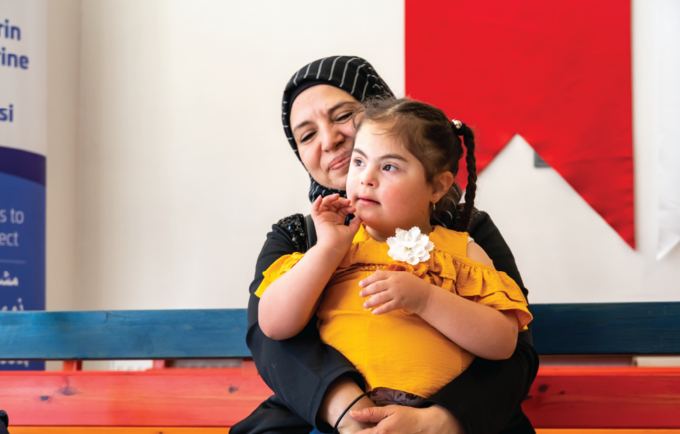An estimated 12 million of forcibly displaced people are persons with disabilities. Leyen is one of them. She and her mother, Rana, have migrated to Turkey six years ago. Rana shares their life with many difficulties in the country.

Approximately 15 per cent of forcibly displaced people in the world live with various disabilities. An estimated 12 million of these people are persons with disabilities. Many refugees with disabilities have difficulty accessing vital services or are not aware of their existing rights and services.
The relationship between Rana and her daughter Leyen is so strong that everyone around them smiles when they hug each other. It is impossible not to get involved in the games that five-year-old Leyen creates with her endless imagination. Rana is a mother who endures every difficulty for her daughter with Down syndrome. It is her confidence and poise that first attracts your attention. Her eyes shining for her daughter despite all the difficulties she has experienced.
It has been six years since they migrated to Turkey. She first describes the difficulties of being forcibly displaced due to the war in Syria. She says that their houses were destroyed in the war and they lost everything they had. Despite the struggle of her daughter with Down syndrome and thyroid and celiac disease, and the health problems of her husband made their lives difficult, “I fought against all kinds of difficulties for the safety of my daughter and finally we came to Turkey,” says Rana.
“We were safer when we came to Turkey, but this time we had to deal with housing, subsistence and language barriers, not to mention Leyen’s need for special education”, Rana explains the difficulties she had to overcome in Turkey. At this point, Rana’s path crossed with our UNFPA service unit in Ankara and she received psychological support. While she regains her self-confidence, her daughter Leyen is provided with private transfer vehicle and translation support to facilitate her transger to and from the hospital and treatment procedures. In addition, necessary guidance is provided for Leyen to receive the special education she needs.
Rana and Leyen also participate in other activities at the centre. Rana says that as she makes friends, she realises that she is not alone and feels better. Rana is also an active member of the Disability Committee She works to support people who need counselling. “At the committee meetings, we talk about the problems we face and discuss how we can solve them, this process increases both our sense of unity and solidarity,” she says.
“Before I met this centre, I had great problems in accessing disability services especially for my daughter, now they help me even when making a hospital appointment, I feel much safer and stronger now that I feel their support with me at all times.”
Their lives are still full of difficulties, but Rana is happy and hopeful that they can plan for their future away from the conflict and most importantly get the support her daughter needs.
Within the scope of the “Increasing Access to Protection Services for the Most Vulnerable Groups Project” implemented by UNFPA Turkey, European Union humanitarian aid funds and Association for Solidarity with Asylum Seekers and Migrants (SGDD-ASAM), refugees with disabilities and their caregivers are supported for equal access to rights and services. The service units in Ankara and Izmir provide counselling, psychosocial support and referral services to increase access to social protection and other services needed by refugees with disabilities.

